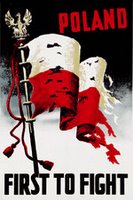Jewsh Fighters of the Belorussian Forests: Review of Defiance
 Defiance: The Bielski Partisans by Nechama Tec
Defiance: The Bielski Partisans by Nechama TecMy rating: 3 of 5 stars
Once again, I'm back with the Polish partisans in WWII. I swear, I have no ulterior motive, I've just been getting pulled back to these same people and lands for the past few years, I'm not sure why.
Then again, maybe this book doesn't count. It depends on who you ask if the land is eastern Poland or western Belorussian (now Belarus, in between part of the Soviet Union). It depends on who you ask what the nationality of the Bielskis was - Polish Jews, Belorussian Jews, Russian partisans, Soviet guerrillas, just Jews?
The story of Tuvia Bielski and his band is harrowing. What else can you expect of a place invaded three times in five years? A place where the choice of language for greeting a stranger could mean the difference between a free meal and a shoot-out? (Incidentally, those language options include Belorussian, Russian, German, Polish, Yiddish, Hebrew, Ukrainian, and Lithuanian).
Part of me was expecting more adventure tales of brave raids and crazy stunts, like a history of the SAS - but Tuvia and company didn't have the luxury of bravery. Instead, the Bielski brothers kept a sanctuary for any and all Jews with just enough violence to keep everyone fed and Soviet authorities off their backs.
The other part of me wanted a primer on building a Robin Hood citadel in the forest. In this I was also denied, but educated on how being mobile in a crisis and preserving people over things or places should be the true priority.
You'll have to excuse me now. I really should be checking the contents of the family's bug-out bags.
View all my reviews >>
Labels: Jews, Partisans, Poland, Review, Soviet Union







